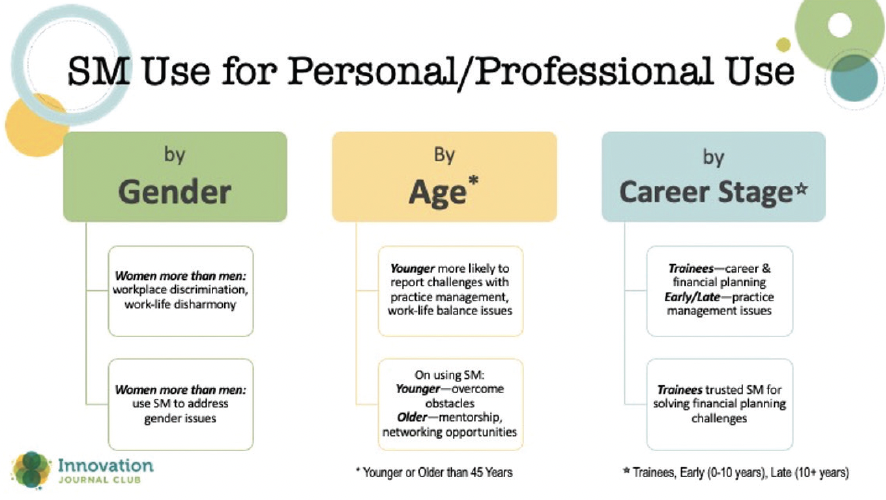
Is social media a help or hindrance in the practice of ophthalmology? In this episode of Innovation Journal Club, ophthalmologist and social media expert Dagny C. Zhu, MD, shares her recent research on how eye care practitioners are using social media. She talks with host I. Paul Singh, MD, about how doctors can harness social media platforms to connect with patients and peers.
How Dr. Zhu First Got Involved in Social Media
During the gap year between graduating from her medical training and purchasing a large refractive surgery practice, Dr. Zhu decided to learn how to use social media to reach prospective patients. As she told Dr. Singh, “I understood that to be successful these days, you should have a presence or brand online for patients to find you. You don’t wait for them to knock on your door.” At the time, Dr. Zhu didn’t have an Instagram account; a relative helped her get on the platform and showed her how to create posts and stories.
She now uses this tool for educational purposes, and she believes that, for physicians, branding oneself on social media is foremost about establishing credibility and expertise. “You want to be viewed as someone who’s knowledgeable about your specialty,” she said. Her second objective is to be personable and relatable to her audience. She shares aspects of her personal life that paint a larger picture of the person she is: female physician, practice owner, mother, and immigrant. “I share a lot about my immigration story,” she tells Dr. Singh. “I hope to provide a beacon of hope to people who are going through the same thing. So, my brand, it’s not all about marketing and pushing my practice and my services. It’s about me as a whole.”
Dr. Zhu says that while digital marketing efforts have helped bring in refractive surgery patients with each viral video, a large number of her patients are students and colleagues who have followed her for years and have chosen her as their surgeon. Establishing this trust and rapport early, Dr. Zhu says, makes it easier for her in the exam room to talk honestly with the patient about his or her visual needs and the treatments she recommends.
Dr. Zhu’s Published Survey
Dr. Zhu and colleagues published three papers this year on the use of social media in ophthalmology, two of which she described to Dr. Singh.
The first article was a survey of social media usage among ophthalmologists during the COVID-19 pandemic.1 In fact, the idea for the survey developed through social media—two medical students had messaged Dr. Zhu on her Instagram account to ask if she would be willing to conduct research with them. In 2020, the team sent a cross-sectional survey via social media channels to ophthalmologists asking them about their reasons for using social media (ie, personal, professional, educational, mentorship, networking, etc.). Dr. Zhu and the students then categorized the respondents by gender, age, and career stage. Perhaps expectedly, younger practitioners use social media to learn real-world skills, such as financial literacy, and to connect with mentors in their professions. More established physicians, meanwhile, tend to use their platforms to educate patients as well as colleagues. Interestingly, women were more likely than men to use social media as a tool for finding communities of support and achieving work-life harmony (Figure 2).

Figure 2. In one of three research studies on SM published by Dr. Zhu this year, the authors sought to understand usage patterns by gender, age, and experience in the field.
Earlier this year, Dr. Zhu published an article in the Journal of Clinical Ophthalmology titled Ophthalmology and Social Media: An In-Depth Investigation of Ophthalmologic Content on Instagram.2
“It was the first of its kind,” she told Dr. Singh. With that study, Dr. Zhu and colleagues were trying to pinpoint what types of ophthalmic content went “viral” or had greater levels of engagement. They found that static images that featured objects (eg, a fundus) instead of people and educational content that contained no relatable personal experience (eg, an anecdote about the patient’s backstory or how the physician handled a case) had the least engagement. Dr. Zhu offered one tidbit: to boost the engagement of an Instagram post, wear a white lab coat. “It establishes your authority,” she says.
Dr. Zhu was also an author on a paper published in 2022 looking at how patients use Reddit to ask and address eye-related medical questions in place of a professional consultation.3
1. He B, Tanya SM, Costello F, Kherani F, Shamie N, Zhu D. Navigating personal and professional development through social media in ophthalmology. Clin Ophthalmol. 2022;16(10):2263-2274.
2. Huang AS, Ne’ma Abdullah AA, Chen K, Khu D. Ophthalmology and social media: an in-depth investigation of ophthalmologic content on Instagram. Clin Ophthalmol. 2022;16(3):685-694.
3. Dave AD, Zhu D. Ophthalmology inquiries on Reddit: what should physicians know? Clin Ophthalmol. 2022;16:2923-2931.
